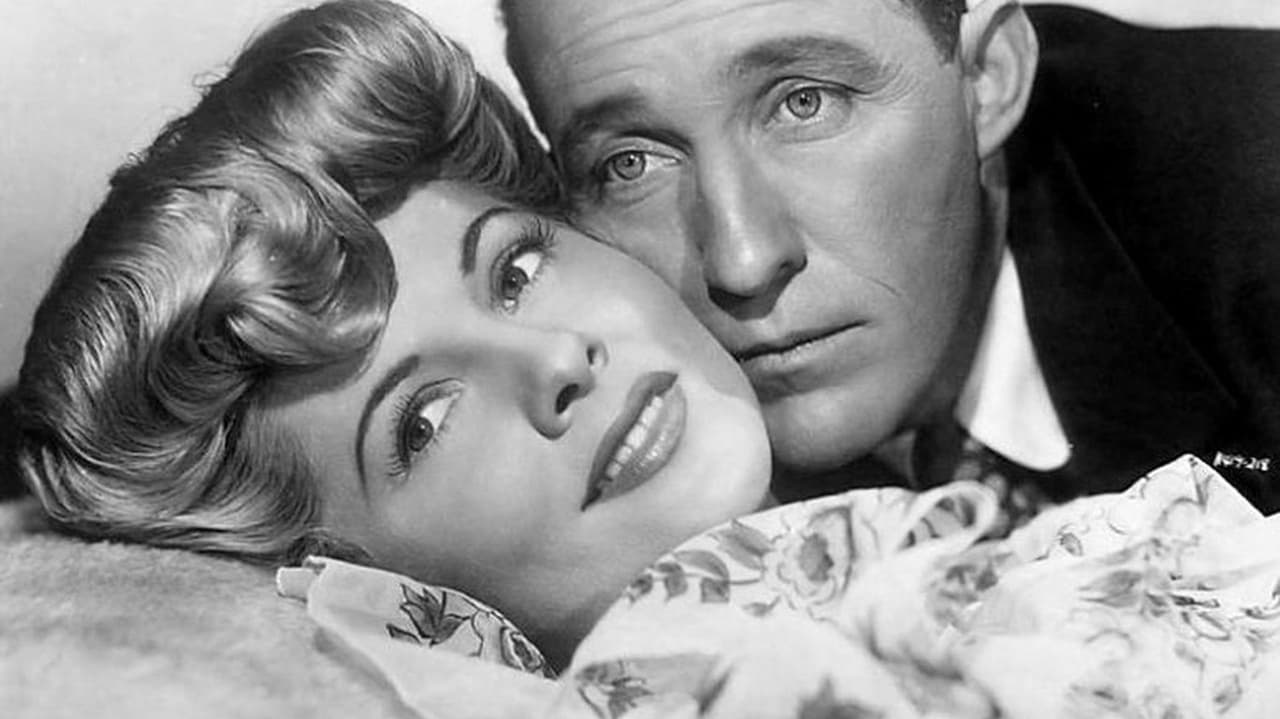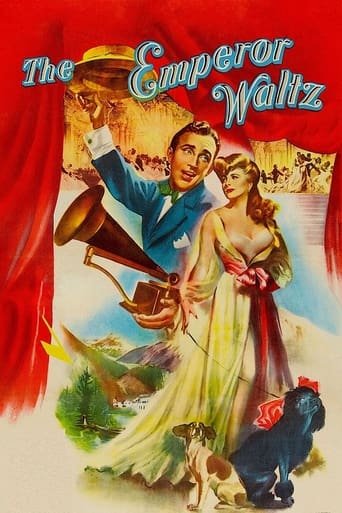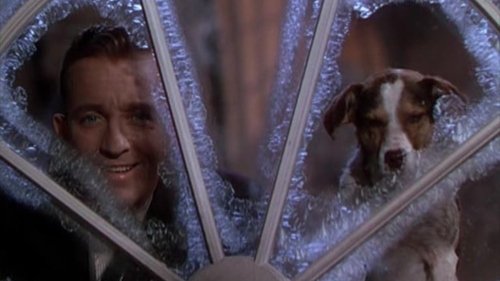


Fantastic!
... View MoreBrilliant and touching
... View MoreThe film makes a home in your brain and the only cure is to see it again.
... View MoreIt’s not bad or unwatchable but despite the amplitude of the spectacle, the end result is underwhelming.
... View MoreSYNOPSIS: American salesman attempts to introduce phonographs into Austria.NOTES: Locations in Jasper National Park in the Canadian Rockies. The film was shot from June through September 1946. Nominated for prestigious Hollywood awards for Scoring of a Musical Picture (Victor Young) (lost to Easter Parade), and Color Costume Design (lost to Joan of Arc). Domestic rental gross exceeded $4 million, which made it Paramount's number two (after The Road to Rio) boxoffice attraction of 1947-48. (Or if you want to take the calendar year 1948, the movie still came in second, but this time after The Paleface). Second to Road to Rio as Paramount's top-grossing Australian release of 1948. Bing Crosby, Best Actor of 1948 - Photoplay Gold Medal Award.COMMENT: Although some critics might regard this as a minor Billy Wilder exercise, it is in fact every bit as entertaining - perhaps more so - than such highly regarded Wilder comedies as A Foreign Affair and Some Like It Hot. Moreover it is sumptuously set and photographed, ingratiatingly acted, with Bing in fine voice, and Strauss music to boot. Crosby and Fontaine make particularly engaging principals and are well served by an outstanding support cast led by Richard Haydn, superbly raspy (and excellently made up) as Franz Joseph, and Roland Culver as an opportunistic if blue-blooded wastrel. Nice to see Sig Rumann and Lucile Watson (though we have never been able to spot Doris Dowling). Bert Prival is outstanding in an unexpectedly funny bit as the chauffeur who forsakes his staidness to slide down the banisters. Wilder's puckishly bizarre sense of humor is always in evidence, leading up to a frighteningly suspenseful climax in which the His Master's Voice pups are rescued from the evil Culver and Rumann. In all, doubtless due to Brackett's influence and contribution, Wilder has balanced the movie particularly well between farce and fantasy, romance and risibility, comic cut-ups and more realistic characterization, songs and suspense. The traditions of musical comedy are integrated with those of the comedy of manners. Both are not only exploited to the full, but gently lampooned.
... View MoreThe mystery is that it took me so long to succumb to the charms of this musical. There are few writer/directors I admire more than Billy Wilder and few entertainers I enjoy more than Bing Crosby. I don't know what I expected when they got together, but I guess it wasn't "The Emperor Waltz". Initial disappointment was erased on a recent viewing.Our story is set in the long ago Austria of Emperor Franz Josef and concerns the love affair between a haughty widowed countess (Joan Fontaine) and a brash American salesman (Crosby). Ditto her purebred poodle and his mutt. There is a lot of talk about class differences and bloodlines and, through the years, this has been my major gripe with the script. Perhaps at the time in the late 40s Bracket and Wilder felt the need to make some sort of a statement, but it's a tad heavy handed and detracts from the fun - and there is fun.The musical numbers are presented wittily. For "In Dreams I Kiss Your Hand" Bing sings, then brings in a piano, then two policemen pick up violins and then the domestic staff starts to dance. When our countess swoons after a few boo-boo-boo's, you know it's all in fun. The uninspired humorist often remarks when watching a musical "where did the orchestra come from?". In the enchanting "The Kiss in Your Eyes", there is no need to ask as an entire village puts bow to string to accompany this most stirring of love songs.The Technicolor filming is sumptuous and truly befitting the operetta-like sensibility of the movie.Joan Fontaine is every inch the royal lady, looking lovely in her costumes and easily handling the comic and dramatic portions of the script. A nice transition from her young, vulnerable characterizations to the more confident females she portrayed in the 50s.Early in the film Bing Crosby tends to shout his way through Virgil, but his character is a lone fish out of water with no kibitzing pal such as a Hope or Fitzgerald. Once he starts to sing - well, like the Countess, it is easy to fall for the go-getting salesman.Lucile Watson is a delight as a dowager princess with a penchant for storytelling and for our Countess' profligate father played in fine style by Roland Culver.The top performance comes from Richard Hadyn as Emperor F-J himself. Unrecognizable under the whiskers and make-up, and foregoing his famous nasally precise delivery, Mr. Hadyn gives us a very interesting Franz-Josef. A petulant, funny, irritating, thoughtful and memorable character. You will pinch yourself to remind you of who you are watching.I heartily recommend this musical of much charm. Mystery solved.
... View MoreAfter having read all the negative reviews and the complaints about Crosby wrecking Wilder's original intention with the film, I was quite amazed to discover that I liked this film a lot. Crosby's interference isn't noticeable, by which I mean that the film has a quite evenhanded tone. And near the end, Crosby is absolutely horrid to Joan Fontaine (cruel to be kind, but he still takes it to extremes) in a cynical way which just smacks of Wilder's black-heartedness. Crosby's character in this film is also somewhat different from his usual persona: not laid-back, but a pushy, brash, fast-talking salesman (Hope or Cagney might have suited the story even better). Joan Fontain is very icy and remote at first (making her unattractive), but she melts very convincingly once the love affair starts. The film is also a sort of a parody of the musical: Crosby's yodelling song is full of yodel jokes, and during THE number of the film (I kiss your hand in dreams madame), a chamber-maid, Fontaine's goofy chauffeur and the middle-aged pudgy 'receptionist' of the inn at which Mr. C is staying launch into a wonderfully silly (deliberately so) ballet routine clearly intended as a stab at the conventions of the genre. The last part of the film becomes less amusing, and the puppy finale drags a bit, though the final confrontation with Franz Joseph (a great Richard Haydn) makes up for the lull. Finally, Fontaine has one of the greatest lines in movie history when she finally surrenders to Crosby: 'My husband was dashing and suave. He was 6'2". He was the most handsome man in all of Austria. You're so different!!' And kiss. Sheer brilliance.
... View MoreThis is not a great Billy Wilder film, but any film he's involved in is worth looking at. Like Orson Welles, even when he's below par in his work he's ahead of the pack. Here Wilder is going back to his roots - he came from Austria, and just left it before the Nazi seized control (I think two aunts of his died in concentration camps). Wilder knew what the highbound, tradition controlled court and government of Austria Hungary was like, with it's unofficial racism towards Jews and Slavs. Only Hungarians (by force) got equal treatment to the Austrians in the government and army. If Jews did well in the professions or business they were hated for it. Only Erich von Stroheim would have had a similar idea of the truth, but he looked elsewhere at the sordidness of the court - at it's sexual peccadillos. But the film is not successful in capturing that image. It comes closest when Richard Haydn (as the old Emperor Franz Joseph - possibly his best straight acting job/though his performance as a sadistic nobleman in FOREVER AMBER is close to it)tells Bing Crosby why the marriage between him and Joan Fontaine would fail. Fontaine would soon be pining for those fine aristocratic experiences and events that she would never be able to go back to once she married a commoner. Haydn compares aristocrats to snails - serene and haughty in their little shells, but remove them from their shells and they die. It may be wrong here (the movie ends with Crosby and Fontaine united), but in reality it hasn't always worked. Look at the tradition bound Windsor family and their marriage fiascos.Oddly enough, just as Wilder failed in his attempt to make a film about the Austro-Hungarian Empire Max Ophuls made the classic Viennese romance of that period - A LETTER FROM AN UNKNOWN WOMAN, starring Fontaine and Louis Jordan. It was not on the scale of THE EMPEROR WALTZ, but it is better remembered and enjoyed, and gave Fontaine a memorably tragic character. If one wants to get a glimmer of the zeitgeist of old Wien see the Ophuls movie. And if not that see a British film starring Lili Palmer, BEWARE OF PITY, which also captures the neurosis of the upper classes in that age. As for THE EMPEROR WALTZ, watch it for Haydn's fine performance, Crosby's singing and comic moments (when he turns a phonograph into a 19th Century berry juicer, which is a lovely little scene), and Roland Culver's social plotting. You'll find these all quite enough to enjoy the movie.
... View More